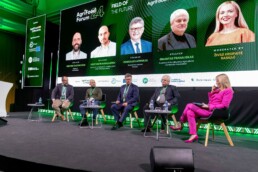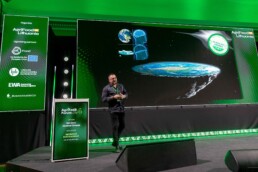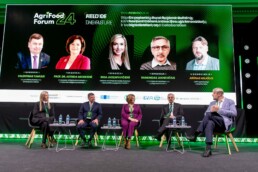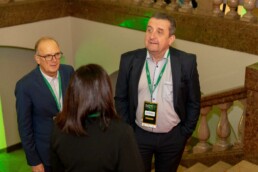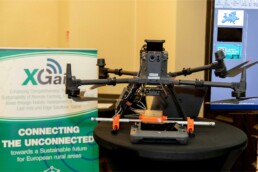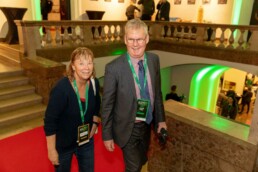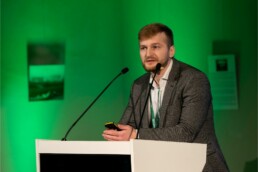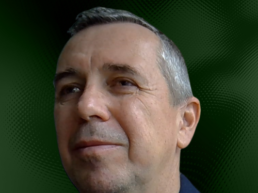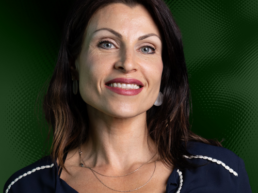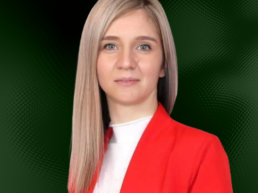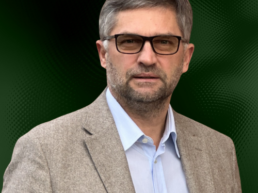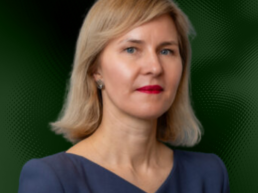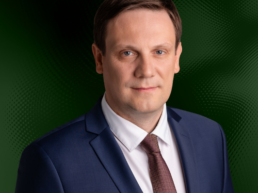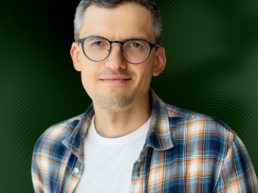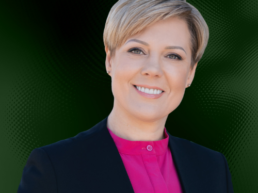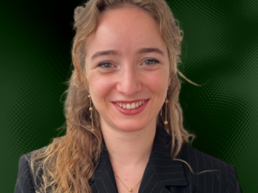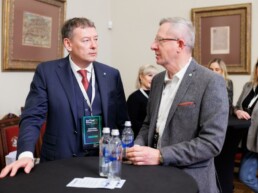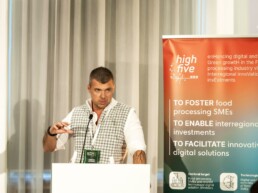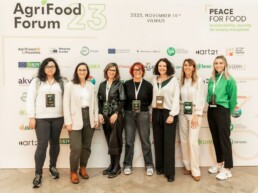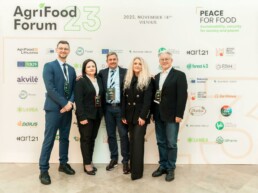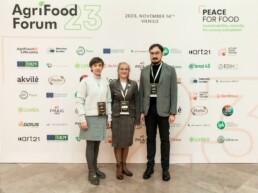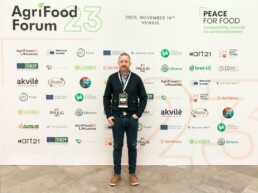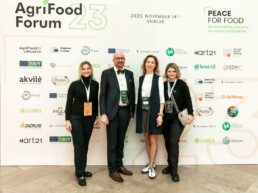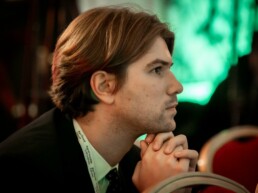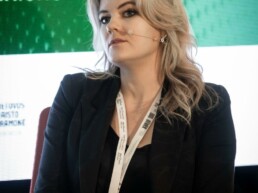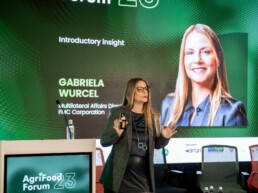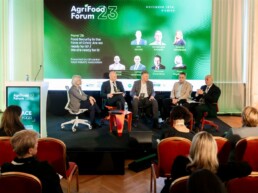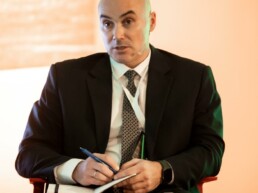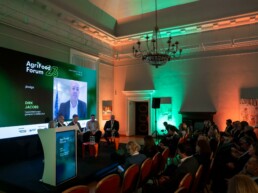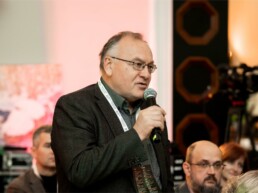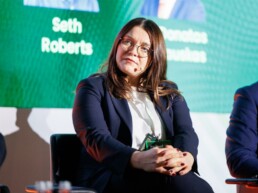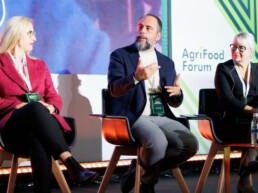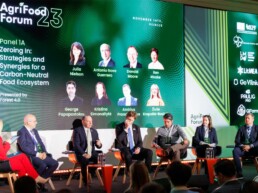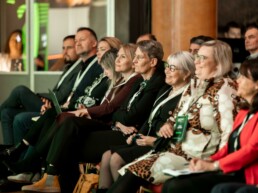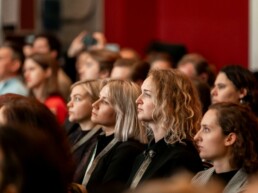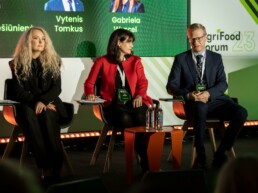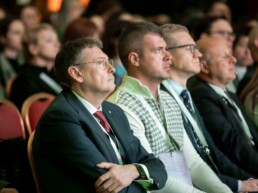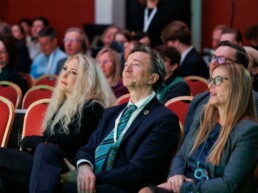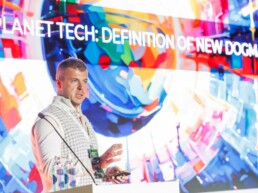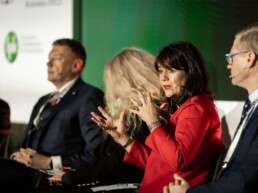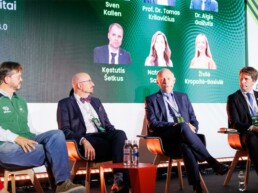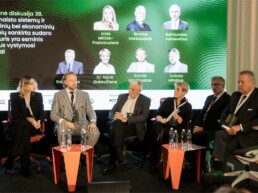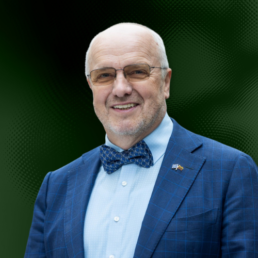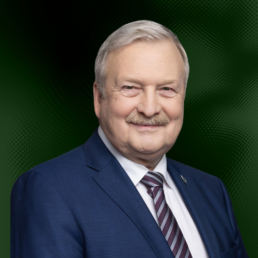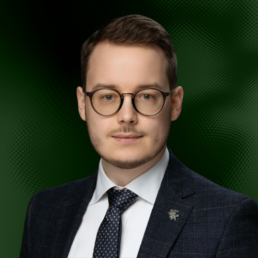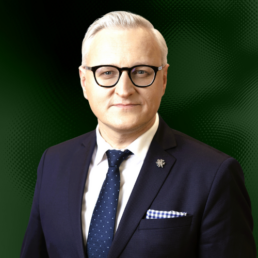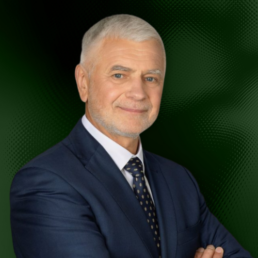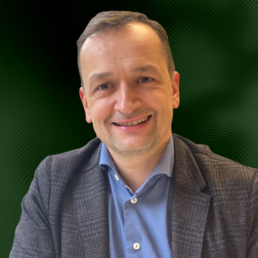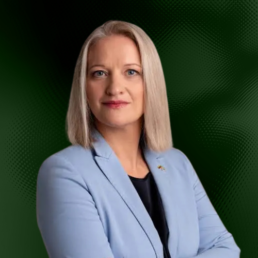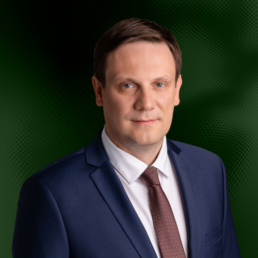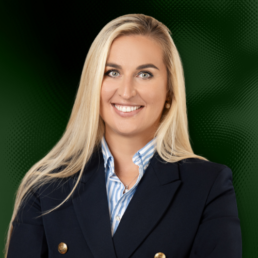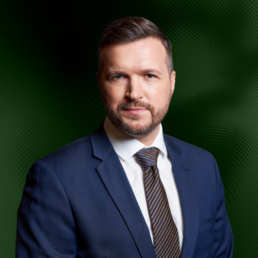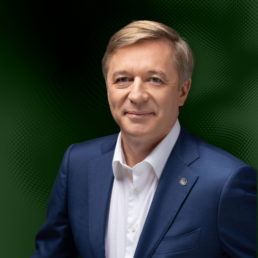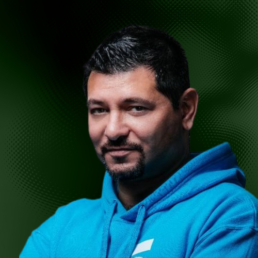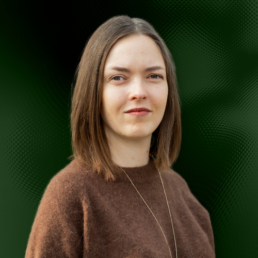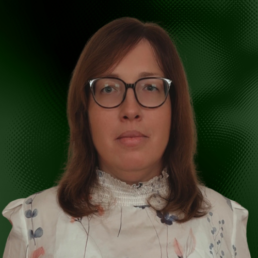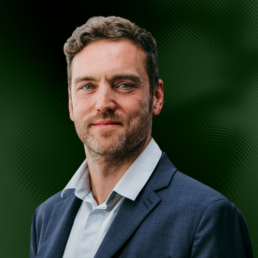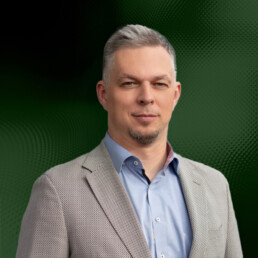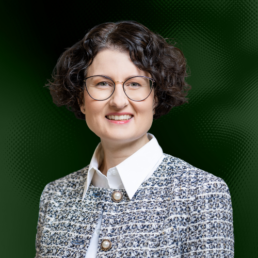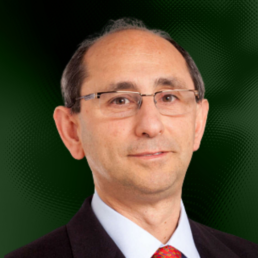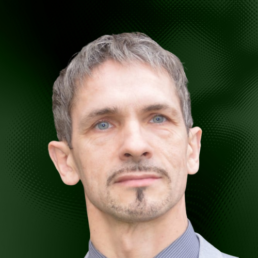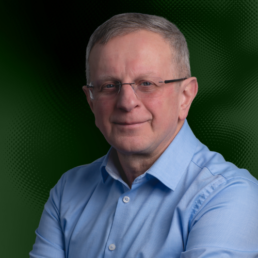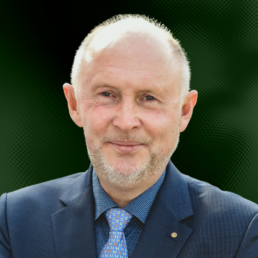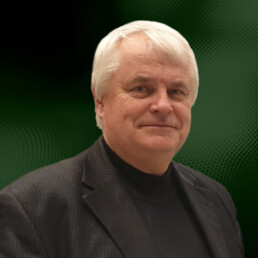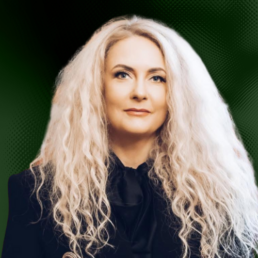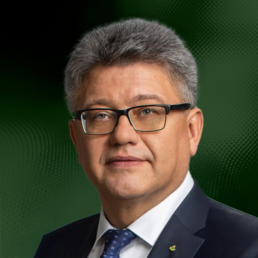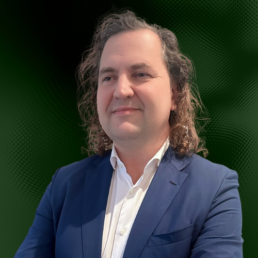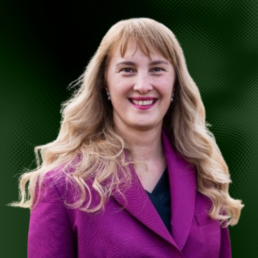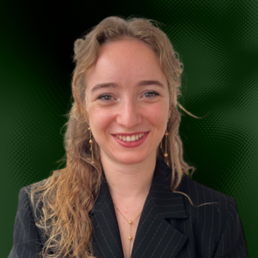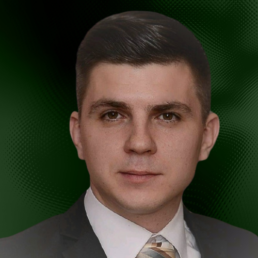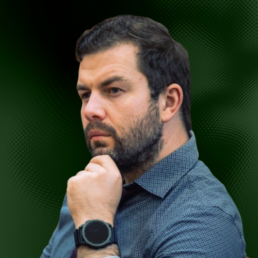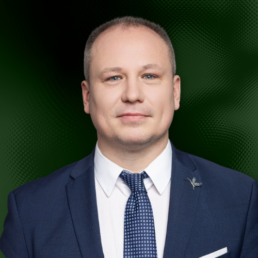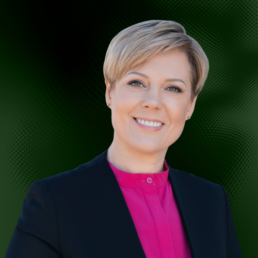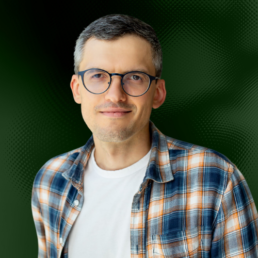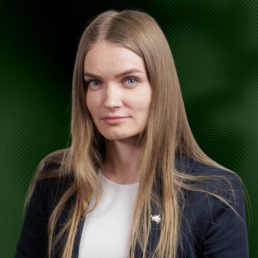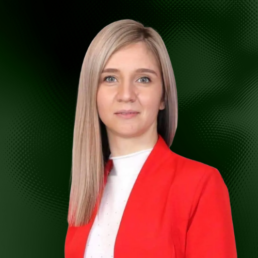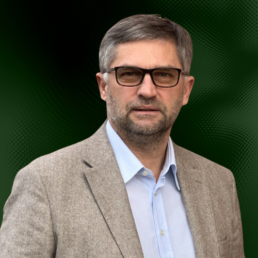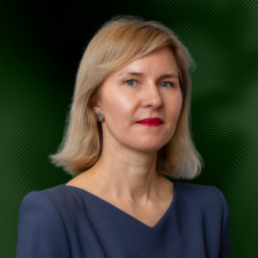AgriFood Forum is the most important annual event in the Baltic region, now in its sixth year, dedicated to shaping the future of the agri-food sector through dialogue, collaboration, and innovation.
AgriFood Forum 2025 will become the key meeting place for policymakers, business leaders, scientists, and innovators, where the long-term vision for a sustainable, resilient, and secure agri-food system in Lithuania and Europe will be defined.
For the first time taking place at the Palace of the Grand Dukes of Lithuania, the event will highlight the importance of public-private partnerships, investments, and science cooperation in shaping policies that foster innovation, food security, and a socially just transformation.
THE FIELD OF THE FUTURE: Directions of Innovation, Policy, and Investment for a Sustainable, Resilient, and Secure Agri-Food System in Lithuania and Europe
This year’s theme – “THE FIELD OF THE FUTURE: Directions of Innovation, Policy, and Investment for a Sustainable, Resilient, and Secure Agri-Food System in Lithuania and Europe” – invites participants to view innovation as a multi-level process connecting local, regional, national, and international developments.
Main objectives of the Forum:
- To shape agri-food innovation and food security policy in Lithuania and Europe.
- To strengthen investments in sustainable, resilient, and secure solutions.
- To promote multi-level innovation growth – from company to European and global scale.
- To empower regions and rural areas to become ecosystems of innovation and food security.
- To enable people to drive change – encouraging generational renewal, gender equality, and social justice.
- To enhance international cooperation and European leadership in food security.
The event aims to bring together more than 300 participants from over 20 EU Member States, representing nearly 100 organizations and companies.
During the event, there will be plenty of networking opportunities – including coffee breaks, lunch, and the GALA dinner, where forum participants will be able to discuss key issues and establish connections for future collaboration. An exhibition area will also be available, and guests will have the opportunity to visit the unique Palace of the Grand Dukes of Lithuania.
We expect the upcoming AgriFood Forum to yield multiple positive outcomes:
The forum will contribute in the development of strategic recommendations for policymakers, focusing on promoting National and Regional Digital and Innovation Strategies for the agrifood sector. These recommendations will aim to ensure coherence across regulatory frameworks, simplify bureaucratic processes, and create an enabling environment that fosters the adoption of sustainable technologies and practices.
The forum will drive collaboration among government bodies, businesses, and civil society to support the digital and innovation transformation of agrifood. Participants will establish frameworks for cross-sectoral partnerships that emphasize building resilient regional ecosystems and a more coherent public-private response to global challenges in the agrifood sector
By promoting inclusive access to technological and non-technological innovations, the forum will provide pathways for all stakeholders, including smallholder farmers, to benefit from the twin transition. Initiatives will include expanding digital infrastructure in rural areas, capacity building, and encouraging micro-entrepreneurship within the agrifood value chain to support underserved communities.
A special emphasis will be placed on empowering women entrepreneurs through showcasing ongoing successes from the EWA and Grassceiling initiatives. This outcome will underline the role of women-led innovations in driving sustainable change and provide actionable steps to increase female participation in the agrifood innovation ecosystem.
The forum will develop actionable strategies to strengthen value chain relationships, enhance communication between stakeholders, and foster an environment that encourages data sharing, collaboration, and the adoption of new technologies. By focusing on both technological and innovative approaches, the forum will ensure that agrifood systems are prepared to withstand future shocks, adapt to changing conditions, and deliver on sustainability goals.
Participants will gain practical insights into how AI, data science, and other advanced technologies can enhance decision-making, resource management, and efficiency in the agrifood sector. The forum will also address the barriers to adoption and explore how innovation can be scaled up to benefit all stakeholders along the value chain.
Emphasizing the importance of skills development, the forum will provide recommendations for farmer-centric training initiatives that empower stakeholders with the necessary skills to effectively utilize advanced technologies and adopt innovative practices. These initiatives will be designed to address the diverse needs of different farming communities, ensuring that no one is left behind in the transition to a more sustainable agrifood future.
By bringing together policymakers, industry leaders, academics, and innovators, AgriFood Forum 2024 will serve as a catalyst for sustainable change, driving AI-powered solutions and overall innovations, and fostering cross-sectoral cooperation for a more resilient, equitable, and sustainable food future.

Speakers
Juozas Olekas
Bronis Ropė
Dr. Antanas VENCKUS
Bronius Markauskas
Christian Holzleitner
Jane Richardson
Jekaterina Rojaka
Tomas Tomilinas
Daiva Jakaitė
Rovena Grikienė
Andrius Pranckevičius
Prof. dr. Dimitri Schuurman
Pietro D’Arpa
Zigmas Medingis
Gintaras Vilda
Krystyna Springer
Assoc. Prof. Dr. Algis Gaižutis
Eimantas Pranauskas
Niels Peter Pretzmann
Prof. Dr. Felix Arion
Adina Golombeck-Tauyatswala
Karri Kallio
Mindaugas Šilininkas
Virginija Andrulė
Dr. Tomas Vaičiūnas
Vilma Kapočienė
Sandra Sejavičienė
Gediminas Raila
Arūnas Svitojus
Agnė Bagočiutė
*The list of speakers will be updated.

Agenda
Hall A
08:00 - 09:00 Registration & B2B matchmaking breakfast
09:00 – 09:30 Opening remarks
Juozas Olekas Speaker of the Seimas of the Republic of Lithuania
Benas Kazlauskas Advisor to the President of the Republic of Lithuania
Dr. Antanas Venckus Head of the International Relations and Export Promotion Division Ministry of Agriculture of the Republic of Lithuania
Simon Maas AgriFood Capital
Kristina Šermukšnytė CEO AgriFood Lithuania, Vice President European Clusters Alliance
09:30 – 10:30 High-Level Policy Opening Panel: Building Europe’s Food Security Through Innovation, Policy and Investment
Objective:
This high-level opening session will set the strategic direction for the AgriFood Forum 2025, uniting top policymakers and institutional leaders from the European Union, the OECD, and Lithuania.
It will define how multi-level innovation, policy coherence, and strategic investment can strengthen Europe’s food system resilience, security, and competitiveness in an increasingly complex global environment.
The discussion will provide the political and institutional framing for the Forum linking the OECD’s global agenda, the EU’s Green Deal, Farm to Fork Strategy, and Strategic Dialogue on the Future of Agriculture, as well as Lithuania’s national ambitions as a regional leader in agrifood innovation and bioeconomy development.
Introductory insights:
Jane Richardson Head of OECD’s Biosafety, Novel Foods/Feeds Safety and Pesticides Programmes is the Executive Secretary of the Internal Co-ordination Group for Biotechnology
Panelists:
Vidmantas Janulevičius President of the Lithuanian Confederation of Industrialists
Aivaras Abromavičius Former Minister of Economy of Ukraine, Investor, Entrepreneur
Jekaterina Rojaka Member of Seimas of the Republic of Lithuania, former vice minister at Innovation and Economy Ministry of the Republic of Lithuania
Daiva Jakaitė Head of European Parliament Liaison Office in Lithuania
Dr. Antanas Venckus Head of the International Relations and Export Promotion Division Ministry of Agriculture of the Republic of Lithuania
Moderator: Kristina Šermukšnytė CEO AgriFood Lithuania, Vice President European Clusters Alliance
10:30 - 10:50 Keynote Presentation
Ramūnas Karbauskis Visionary Entrepreneur, Owner of Agrokoncernas Group
Hall A
10:50 - 11:50 High-Level Opening Panel Multi-Level Innovation as a Policy Framework: From Firm to World – How Policy Can Enable Innovation at Every Level of the Agrifood System
This session opens the Forum by translating the OECD Oslo Manual’s four levels of innovation into a policy and ecosystem framework for Europe’s agrifood transformation. It connects global policy leadership (OECD, EC) with European and regional implementation (clusters, ecosystems, innovation networks) showing how to turn policy ambition into practical, scalable impact
Key Discussion Themes:
- Connecting innovation levels: how to align “new-to-firm” to “new-to-world” innovations through coherent policy and support frameworks.
- Clusters as system orchestrators: why European and regional clusters are essential intermediaries between policy and enterprise innovation.
- Policy–investment alignment: ensuring that European, national, and regional programmes reinforce one another.
- OECD and EU cooperation: creating shared metrics and governance models for food system resilience.
Jekaterina Kalinienė, Innovation Agency Head of Biotech Lab
Diāna Līva, Policy expert at the Ministry of Agriculture of the Republic of Latvia
Simon Maas, AgriFood Capital
Virginija Andriulė, Director EKOAGROS
Mindaugas Snarskis, CEO at “Vikonda group”
Susanah Aalto Ecosystem manager Nordics and Baltics at EIT FOOD
Moderator: Živilė Kropaitė-Basiulė, journalist
11:50 - 13:00 Regions and Living Labs as Accelerators of Multi-Level InnovationHow regional ecosystems turn policy into practice across Europe’s agrifood value chains.
Building on the policy framing, the goal is to show how regional ecosystems and Living Labs drive Europe’s agrifood transformation by connecting innovation policy to enterprise-level action.
Using the OECD’s four levels of innovation (new-to-firm, region, market, world), this panel highlights how local experimentation and interregional cooperation make the system work in practice.
Key Discussion Themes:
- From policy to pilots: how EU and national strategies are translated into regional action.
- Living Labs as the “doing infrastructure” of innovation — co-creation, testing, and de-risking new technologies.
- Interregional learning : scaling impact through collaboration and shared methodology.
- Bridging innovation and funding: how intermediaries and agencies support SMEs and start-ups.
- Learning from evidence: what OECD and regions can jointly measure to track system transformation
prof. dr. Dimitri Schuurman Senior Research Strategist European Network of Living Labs, visiting professor strategic design and innovation management at Ghent University
Adina Golombeck–Tauyatswala Innovation and Europe Agency for the North Rhine-Westphalia region ZENIT GmbH / NRW Europa
Mar Ylla Gelabert European Network of Living Labs
Karri Kallio Research and Development Manager, Sustainable Food Solutions “SeAMK University” of Applied Sciences, SIXFOLD
Anja Leissner Food Innovation Expert
Michiel Strijland Business Development Manager at AgriFood and Circular Economy Team INVEST-NL
Moderator Simon Maas AgriFood Capital
13:00 - 14:00 Networking Lunch
14:00 - 15:00 Panel Discussion: Carbon Credits in Agriculture and Forestry: From Brussels to Lithuanian Fields
This session brings together policymakers and practitioners to discuss the rapidly evolving landscape of Carbon Removals and Carbon Farming (CRCF) Regulation in Europe and Lithuania.
It connects EU policy development and carbon market regulation with national implementation and farmer-level practice, showing how European ambition can translate into measurable impact and new opportunities for the agricultural sector.
The discussion takes place at a key moment – as Lithuania’s competent bodies are set to become operational from January 1, 2026, marking a new stage in the governance of carbon removal and carbon farming mechanisms.
Key Discussion Themes:
EU policy direction: what the upcoming Carbon Removal and Carbon Farming frameworks mean for Member States and farmers.
National readiness: how Lithuania is preparing institutions and regulatory systems to implement carbon credit schemes.
Practical challenges and opportunities: lessons from farmers already applying sustainable and climate-smart practices.
Financing and certification: ensuring trust, transparency, and accessibility in carbon credit mechanisms for small and medium-sized farms.
Collaboration across levels: linking policy, science, and practice to scale carbon farming across Europe.
Introductory insights: Christian Holzleitner Head of Unit for Land Economy and Carbon Removals Directorate-General for Climate Action European Commission
Panelists:
Tomas Orlickas Deputy Director of the National Paying Agency
Krystyna Springer Senior Policy Analyst, Land Use and Climate Programme of Institute for European Environmental Policy
Rovena Grikienė Advisor at the Crop Production and Agrarian Environmental Protection Division of the Ministry of Agriculture of the Republic of Lithuania
Assoc. Prof. Dr. Algis Gaižutis Associate Professor at the Faculty of Economics and Business Administration Vilnius University, Chairman of the Board of the Lithuanian Forest and Land Owners Association
Diāna Līva Policy expert at the Ministry of Agriculture of the Republic of Latvia, PhD candidate at Latvia University of Life Sciences and Technologies
Eimantas Pranauskas President Lithuanian Association of Agricultural Companies
Moderator: Romualdas Lapickis Senior Project Manager AgriFood Lithuania
15:00 - 15:15 Key Note Presentation
“Agroforestry – Increasing Forest Cover by Using Agricultural Land”
Remigijus Lapinskas Head of the Green Policy Institute, Entrepreneur, Investor, Public Figure
This keynote will explore how agroforestry can serve as a strategic tool to increase forest cover while maintaining productive use of agricultural land. It will highlight practical models for integrating trees into farming systems, the environmental and economic benefits of agroforestry, and the policy opportunities that can support its wider adoption in Lithuania and across Europe.
15:15 - 16:15 The Farm of the Future: From Practice to Policy: Regenerative, Solar, Wind and Biogas Energy for Sustainable AgriFood Transformation
Powered by BioSolFarm
The Farm of the Future is not only powered by renewable energy – it is built on the principles of regeneration, circularity, and resilience.
This panel will explore how solar, wind, biogas, and regenerative agriculture practices are being implemented across farms and regional agrifood ecosystems, creating a bridge between practical innovation and policy frameworks.
Speakers will highlight how renewable energy systems, carbon-smart soil management, and closed-loop resource use can reduce emissions, enhance biodiversity, restore soil health, and generate new income streams for farmers and rural communities.
The session will also emphasize how Lithuania and the wider Baltic region can lead in developing decentralized, green, and regenerative farming models that empower producers, strengthen ecosystems, and advance Europe’s climate neutrality goals.
Key Discussion Themes:
- Regenerative energy and agriculture: integrating solar, wind, biogas, and soil health into one sustainable system.
- Circular and carbon-smart farm management: linking energy efficiency, nutrient recycling, and carbon sequestration.
- From Living Labs to large-scale adoption: real-life examples of farms as innovation ecosystems.
- Policy and investment: aligning CAP, green finance, and innovation programs to scale regenerative transitions.
- Regional cooperation and the role of clusters in expanding sustainable and energy-smart farming across Europe.
Introductory insights: Niels Peter Pretzmann visionary entrepreneur, owner Farmer’s Circle, Winner of the Regenerative Farm category at Baltic sustainability awards.
Panelists:
Niels Peter Pretzmann visionary entrepreneur, owner Farmer’s Circle, Winner of the Regenerative Farm category at Baltic sustainability awards
Agnė Domarkienė Head of Services at ESO National Energy Operator
Felix Arion Director of Department of Economic Sciences Responsible of Master Food Identity University of Agricultural Sciences and Veterinary Medicine Cluj-Napoca, project EENOVA (energy efficiency in the agrifood value chain)
Rolandas Dockevičius associated partner in BioSolFarm project
Agnė Bagočiutė Director Lithuanian Energy Agency
Remigijus Lapinskas Head of the Green Policy Institute, Entrepreneur, Investor, Public Figure
Moderator: Giedrius Surplys Former Minister of Agriculture of the Republic of Lithuania, Policy expert
16:15 - Closing of the day at HALL B
Hall B
HALL B powered by LOCALITYInnovation in Action: Circularity, Energy and Social Impact Driving the Field of the Future
11:10 – 11:50Grand Award Ceremony – ENACT Hackathon FinalistsGreeting speechSandra Sejavičienė Adviser to the Minister at the Ministry of Social Security and Labour of the Republic of Lithuania
Powered by 
Celebrating innovation in the social and circular agrifood economy!
Finalist teams from the ENACT Hackathon 2025 will present their groundbreaking ideas and prototypes developed over two days of co-creation and teamwork.
Each finalist will have 3 minutes to pitch their solution to a distinguished jury of innovation experts, investors, and policymakers.
Following the pitches, the jury will announce the winning teams, awarding prizes for the most impactful, scalable, and socially-driven innovations in the agrifood sector.
Master of Ceremony Kristina Šermukšnytė CEO AgriFood Lithuania, Vice President European Clusters Alliance
11:50 – 12:10 Keynote presentation on Climate adaptation and Resilience for Agrifood, Lithuania country analysis
Simon Ouboul Economist, Climate Adaptation and Resilience, OECD Environment Directorate
As climate conditions continue to shift, their impact on global agricultural production is becoming increasingly profound challenging food availability and stability worldwide. Prolonged droughts, together with more frequent and intense floods and storms, are placing unprecedented pressure on farming systems. To sustain productivity and ensure long-term food security, agriculture must not only respond, but effectively adapt.
In this keynote, Simon will present the latest OECD insights on how climate change is shaping agricultural production globally, alongside a dedicated analysis of Lithuania’s situation and resilience needs. He will outline how countries including Lithuania are progressing in strengthening the resilience of their agrifood sectors, offering an evidence-based understanding of where we stand today and what must be done to build climate-resilient agriculture for the future.
12:10 – 13:10 Panel discussionSocial Innovation and the Protein Transition: New Pathways for a Sustainable Food Future
Powered by 
The panel discussion will be in Lithuanian
As Europe rethinks its food systems, the shift toward alternative protein sources from plant-based and microbial to algae is not just a technological change but a social transformation.
This session will explore how social innovation, consumer awareness, and local entrepreneurship are driving the protein transition, shaping new markets and values around sustainability, nutrition, and inclusiveness.
Speakers from research, business, and community initiatives will discuss how to connect scientific breakthroughs with social acceptance, ensuring that Europe’s protein future is sustainable, accessible, and people-centered.
Key Discussion Themes:
- Social innovation in food: empowering communities, start-ups, and consumers.
- The rise of alternative proteins: new business models for circular and sustainable diets.
- Bridging science and society: communicating innovation in food and nutrition.
- Local and regional value creation: from research labs to social enterprises.
- Policy and investment perspectives: supporting the protein transition at scale.
Panelists:
Tomas Tomilinas Deputy Chair of the Committee on European Affairs of the Seimas of the Republic of Lithuania and Member of the Committee on Environmental Protection
Dr. Tomas Vaičiūnas Lifestyle Medicine Expert and Lecturer
Jekaterina Kalinienė Innovation Agency Head of Biotech Lab
Vilma Kapočienė Head of Food Business at Nestlé Baltics
Gediminas Raila, CEO at MMA Foods
Moderator: Monika Kazlauskaitė Business journalist at the news portal Lrytas
13:10 – 14:00Networking Lunch
14:00 – 14:25Keynote PresentationTaste Has No Borders Inspiring Global Success Through Cultural Innovation
Jan Ameri Visionary Entrepreneur & Ecosystem Builder / Founder / Board Member at ArcticStartup
14:25 – 15:30 Investing in the Field of the FutureFinancing and scaling multi-level innovation for Europe’s sustainable and secure agrifood system
Panel in Lithuanian
The goal is to explore how public and private investment can accelerate innovation across all levels — from firm-level adoption to global breakthroughs — and how policy, industry, and finance can jointly enable a resilient and sustainable agrifood future.
The discussion will focus on creating investment coherence: aligning European, national, and private financial mechanisms to scale successful innovations and strengthen food system resilience.
This panel will also explore how Lithuania positions itself as a hub for sustainable agrifood investments.
Key Discussion Themes:
- How to bridge innovation and investment: turning policy priorities into investable propositions.
- The role of industry in mobilising private capital for sustainable agrifood transformation.
- Blended finance and de-risking: how to use public instruments (InvestEU, Horizon, national funds) to attract private co-investment.
- National and regional investment ecosystems: how they can connect SMEs and start-ups to European funding.
- Lessons for OECD and EU policymakers on creating consistent investment frameworks for food security and innovation.
Introductory insights:
Bronis Ropė The Chair of the Committee on Rural Affairs at the Seimas of the Republic of Lithuania
Panelists:
Bronis Ropė The Chair of the Committee on Rural Affairs at the Seimas of the Republic of Lithuania
Andrius Pranckevičius CEO at “Kauno Grūdai”, Chairman at “Kekava Foods”, Deputy Chairman at “Akola Group”
Giedrė Gečiauskienė Board Member at ILTE (National Development Bank)
Vilma Sabaliauskienė WIDEN Partner, Attorney at Law, Head of Environmental and ESG Practice
Aiga Jonele Head of Horizon Europe NCP Group Research Council of Lithuania
Arūnas Svitojus President Chamber of Agriculture of the Republic of Lithuania
Moderator: Arūnas Milašius DELFI Agribusiness editor-in-chief
15:30 – 16:30 Empowering People and Networks for Europe’s Food FutureSkills, inclusion, and leadership for a resilient and innovative agrifood ecosystem.
This closing panel spotlights the human dimension of transformation the people, skills, and communities that make innovation happen. It explores how Europe can empower the next generation of agrifood leaders, ensuring that technological and policy advances are matched by education, inclusion, and collaboration across regions.
Key Discussion Themes:
- Skills for transformation: how universities, clusters, and training programmes prepare the workforce for digital-green agrifood transitions.
- Youth and generational renewal: making agrifood careers attractive to young innovators and entrepreneurs.
- Women in agrifood: strengthening leadership, visibility, and inclusive innovation.
- Entrepreneurial and soft skills: creativity, co-creation, and cross-sector collaboration.
- Connected networks: how organisations build learning communities across Europe.
Introductory insight: Pietro D’Arpa Professor in Sustainable and Circular Supply Chain , Former Vice President Supply Chain-Europe Logistics & End to End Strategic Planning at Procter & Gamble
Aistė Miliūtė CEO at Birštonas Mineral Water / Certified Water Sommelier
Gintaras Vilda EIT Community Officer Lithuania | CEO Manufacturing Innovation Valley
Pietro D’Arpa Professor in Sustainable and Circular Supply Chain , Former Vice President Supply Chain-Europe Logistics & End to End Strategic Planning at Procter & Gamble
Lorena van der Kolk GAIA Global / Young Innovators Network
Giedrius Bagušinskas Coordinator Smart Food Cluster, Director LITMEA
Moderator: Živilė Kropaitė-Basiulė, journalist
16:30 – 17:00Concluding Session
Hall C
11:50 – 13:00Workshop “From Soil to Market: Carbon Credits and Sustainability”
This workshop will bring together farmers, forest managers, agribusiness leaders, and
sustainability experts to explore how carbon credits can transform land use practices in Lithuania
and beyond. The interactive session will examine how agriculture and forest management can
become measurable, tradable climate services, and how companies are preparing to, or already
are, incorporate land-based carbon credits into their sustainability and supply chain strategies.
The session will also share lessons from European partners and consider how Lithuania can
position itself as a leader in climate-smart agriculture and forestry, enhancing both
competitiveness and resilience to climate change.
Key Discussion Themes:
1. Generating carbon credits from improved soil and forest management: practical
requirements, opportunities, and constraints for landowners.
2. The role of companies in integrating land-based carbon credits into sustainability and
decarbonisation pathways.
3. Certification, monitoring, and verification frameworks ensuring trust and credibility in
agricultural and forestry carbon markets.
4. Lessons from European partners on developing competitive, climate-resilient land
management systems through carbon markets.
Group Speakers:
Eimantas Pranauskas, President of the Lithuanian Agricultural Companies Association
Haroldas Sapožnikovas, Sr. Agronomist, UAB Litagra Agricultural Centre
Mindaugas Šilininkas, LFOA Deputy Chairman of the Board
Zigmas Medingis, Advisor at the Crop Production and Green Technologies Division,
Ministry of Agriculture of the Republic of Lithuania
Zigmantas Aleksandravičius, Vice-Chairman of the Lithuanian Farmers’ Union, Chairman of
the Kupiškis Branch
Moderator:
Saulius Damulevičius, Associate Partner, Business Management Consulting, NOEWE
13:00 – 14:00Networking Lunch
14:30 – 18:00SIXFOLD workshop (only by the invitation)
Side events

C2Lab - Vilnius, Lithuania
Lithuania, 14 November 2023 - 15 November 2023
Are you preparing your next project on sustainable agri-food value chains? Or on skills and empowerment? Would you like to expand your network and meet new collaboration partners? Then, C2Lab is the right place for you!

Welcome to B2B matchmaking at the AgriFood Forum 2023
Lithuania, on November 14th, 2023
Enterprise Europe Network partners in Lithuania are organizing an on-site B2B matchmaking event during the AgriFood Forum 2023 in Vilnius, Lithuania, on November 14th, 2023.
Additional information
If you would like to participate in the event with your own exhibition or stand, have an interesting presentation to share, or are interested in becoming a partner of the event, please contact us by email at renginiai@agrifood.lt or call +370 606 79155.
Don’t miss the opportunity to take part in AgriFood Forum 2025 – a unique platform to meet policymakers, business leaders, farmers, and innovators, discover the latest agri-food trends, strengthen cross-sectoral cooperation, boost investments, and promote innovation and bioeconomy solutions, especially in regions and rural areas.


